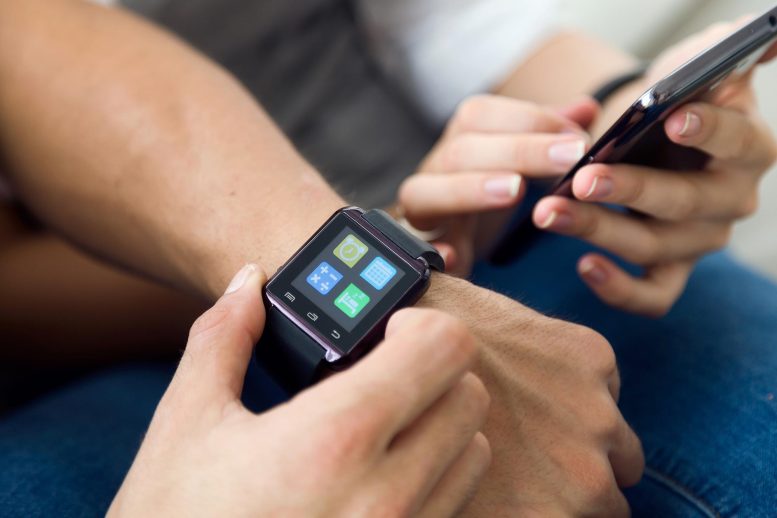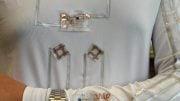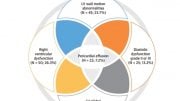
A study has demonstrated that machine learning algorithms applied to data passively collected from wearable devices can be used to gauge an individual’s mental resilience and psychological well-being. The findings suggest that devices such as the Apple Watch could be utilized to remotely monitor and evaluate psychological states without the need for mental health questionnaires. In the study, data from the Warrior Watch Study, involving 329 healthcare workers across seven New York City hospitals, was analyzed. Metrics collected from the Apple Watch, such as heart rate variability and resting heart rate, were found to be predictive in identifying psychological resilience or well-being states, indicating the potential for further assessment of psychological characteristics through wearable data.
Wearable devices may be a means to monitor psychological states through effortless data collection using artificial intelligence.
Researchers at Mount Sinai have shown that data from wearable devices like the Apple Watch, analyzed through machine learning, can accurately assess a person’s mental resilience and well-being. This study suggests a future where psychological states can be remotely monitored without mental health questionnaires, potentially enhancing access to mental health services.
Applying machine learning models, a type of artificial intelligence (AI), to data collected passively from wearable devices can identify a patient’s degree of resilience and well-being, according to investigators at the Icahn School of Medicine at Mount Sinai in New York.
The findings, reported in the May 2nd issue of JAMIA Open, support wearable devices, such as the Apple Watch®, as a way to monitor and assess psychological states remotely without requiring the completion of mental health questionnaires.
The paper points out that resilience, or an individual’s ability to overcome difficulty, is an important stress mitigator, reduces morbidity, and improves chronic disease management.
“Wearables provide a means to continually collect information about an individual’s physical state. Our results provide insight into the feasibility of assessing psychological characteristics from this passively collected data,” said first author Robert P. Hirten, MD, Clinical Director, Hasso Plattner Institute for Digital Health at Mount Sinai. “To our knowledge, this is the first study to evaluate whether resilience, a key mental health feature, can be evaluated from devices such as the Apple Watch.”
Mental health disorders are common, accounting for 13 percent of the burden of global disease, with a quarter of the population at some point experiencing psychological illness. Yet we have limited resources for their evaluation, say the researchers.
“There are wide disparities in access across geography and socioeconomic status, and the need for in-person assessment or the completion of validated mental health surveys is further limiting,” said senior author Zahi Fayad, PhD, Director of the BioMedical Engineering and Imaging Institute at Icahn Mount Sinai. “A better understanding of who is at psychological risk and an improved means of tracking the impact of psychological interventions is needed. The growth of digital technology presents an opportunity to improve access to mental health services for all people.”
To determine if machine learning models could be trained to distinguish an individual’s degree of resilience and psychological well-being using the data from wearable devices, the Icahn Mount Sinai researchers analyzed data from the Warrior Watch Study. Leveraged for the current digital observational study, the data set comprised 329 healthcare workers enrolled at seven hospitals in New York City.
Subjects wore an Apple Watch® Series 4 or 5 for the duration of their participation, measuring heart rate variability and resting heart rate throughout the follow-up period. Surveys were collected measuring resilience, optimism, and emotional support at baseline. The metrics collected were found to be predictive in identifying resilience or well-being states. Despite the Warrior Watch Study not being designed to evaluate this endpoint, the findings support the further assessment of psychological characteristics from passively collected wearable data.
“We hope that this approach will enable us to bring psychological assessment and care to a larger population, who may not have access at this time,” said Micol Zweig, MPH, co-author of the paper and Associate Director of Clinical Research, Hasso Plattner Institute for Digital Health at Mount Sinai. “We also intend to evaluate this technique in other patient populations to further refine the algorithm and improve its applicability.”
To that end, the research team plans to continue using wearable data to observe a range of physical and psychological disorders and diseases. The simultaneous development of sophisticated analytical tools, including artificial intelligence, say the investigators, can facilitate the analysis of data collected from these devices and apps to identify patterns associated with a given mental or physical disease condition.
Reference: “A machine learning approach to determine resilience utilizing wearable device data: analysis of an observational cohort” by Robert P Hirten, Maria Suprun, Matteo Danieletto, Micol Zweig, Eddye Golden, Renata Pyzik, Sparshdeep Kaur, Drew Helmus, Anthony Biello, Kyle Landell, Jovita Rodrigues, Erwin P Bottinger, Laurie Keefer, Dennis Charney, Girish N Nadkarni, Mayte Suarez-Farinas and Zahi A Fayad, 2 May 2023, JAMIA Open.
DOI: 10.1093/jamiaopen/ooad029
Additional co-authors are Matteo Danielleto, PhD, Maria Suprun, PhD, Eddye Golden, MPH, Sparshdeep Kaur, BBA, Drew Helmus, MPH, Anthony Biello, BA, Dennis Charney, MD, Laurie Keefer, PhD, Mayte Suarez-Farinas, PhD, and Girish N Nadkami, MD, all from the Icahn School of Medicine at Mount Sinai.
Support for this study was provided by the Ehrenkranz Lab for Human Resilience, the BioMedical Engineering and Imaging Institute, the Hasso Plattner Institute for Digital Health, the Mount Sinai Clinical Intelligence Center, and the Dr. Henry D. Janowitz Division of Gastroenterology, all at Icahn Mount Sinai, and from the National Institutes of Health, grant number K23DK129835.









Be the first to comment on "Wearable Wonders: How Your Apple Watch Could Gauge Your Mental Resilience"